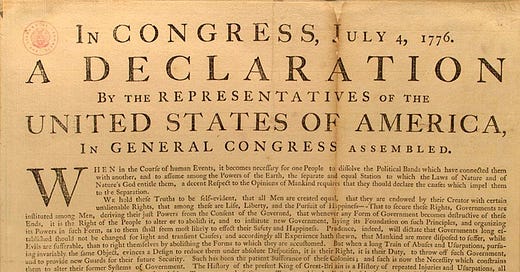The God of the Woke
Can Wokeism truly be a religion if it rejects the explicit notion of a god? The answer hinges upon the definitions of "religion" and "god." By any reasonable measure, that answer is yea.
The American Spirit Essays #32
(Previous: The Woke Soul)
The Deity, Defined
Our discussion of Wokeism as a new religion has studiously avoided one concept that people universally associate with religion: God. Before moving on to the next topic, it behooves us to at least consider it because the strongest counterargument asserting that Wokeism is not a religion is likely to hinge on the absence of any obvious deity from any of its discussions, beliefs, and practices.
Can Wokeism truly be a religion if it does not embrace an explicit concept of the divine? Is “god” a spiritual need that all humans must fill? Will Wokeism eventually—perhaps soon—introduce something to fill that role? As with many such questions, the answers lie far above my pay grade. God may be a genuine entity in reality and/or in the minds of many, but the concept of “god” is elusive. The proper answer to the question: “Do you believe in God?” is “If you define precisely what you mean by ‘god,’ I’ll let you know. Otherwise, how could I answer the question meaningfully?”
The concept of god pre-dated Abraham’s monotheistic insight. Many ancient civilizations believed in localized gods. Travelers routinely paid homage to the god of the places they visited without giving offense to the gods of their own hometowns. In fact, many in the ancient world (centuries after Abraham) found the monotheistic Judaeans unacceptably rude for failing to do so. Who were these strange visitors who insisted that their own deity was both everywhere and far more powerful—even in our own town—than our local god?
Many pagan cultures embraced entire societies of “immanent” gods—essentially superhumans that nevertheless had to operate within the constraints of nature. It’s hardly coincidental that in recent years, the popular Marvel Cinematic Universe has recast the old Norse gods as aliens from the planet Asgard. Immanent pagan gods had more in common with today’s superheroes than with anything in the Abrahamic tradition. For many in the modern world, Abraham, then Moses, then Jesus, then Mohammed, revolutionized the concept so completely that they cannot conceive of an alternative. They and their followers embraced the idea of a “transcendent” God, beyond full human comprehension, in full command of (and thus unburdened by) the laws of nature.
Still, definitions aside, a central thesis of this essay series has been that today’s America—and in particular today’s American elite—is spiritually starved. Wokeism, I have posited, is spreading throughout that population because it addresses unarticulated spiritual needs. Is god such a need?
Keep reading with a 7-day free trial
Subscribe to American Restoration by Bruce D. Abramson to keep reading this post and get 7 days of free access to the full post archives.



